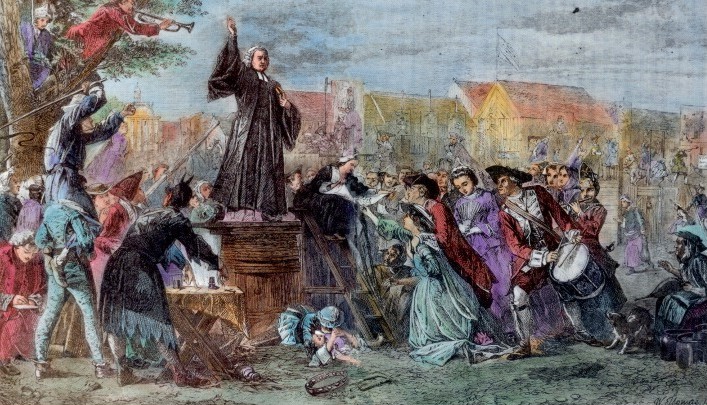The following is the fourth part of a series written by one of our members, David Carrico. Previous parts can be found at the links below:
Part 1
Part 2
Part 3
“Pray, then, in this way: ‘Our Father who art in heaven, hallowed be Thy name. Thy kingdom come.” Matthew 6:9
Stepping through a meditation of the Model Prayer, our next pause to consider is at “Thy kingdom come.” This is a phrase that has so much depth and so many layers of meaning that I could probably write at least a half-dozen blogs on it, or write twenty or thirty pages in this one, and still not cover everything that it contains. I’m not going to do so. But I am going to cover one aspect of it that I haven’t heard discussed much, and the article is still going to be a bit longer than the previous articles in the series.
When you think of kingdoms, what is the one common element that every kingdom has to have? A king.
Have you ever thought about what the purpose of a king is? What function does he serve?
In the grand scheme of things, there seem to be two reasons why societies have created kings and kept them around. First, to govern: to make laws, establish rules, and enforce them. This is the ruling function. The second reason is to serve as the visible embodiment of the kingdom; to be the representation of the kingdom as a whole. This is the reigning function.
In human kingdoms those two functions were not always united in the same person. In the Empire of Japan, for example, there was an extended period of history where the Emperor reigned, but the Shogun (warlord) ruled. And in England, a struggle began during the reign of King John in the 1200s that after a few hundred years eventually culminated with the ruling function passing to Parliament and the ministers, so that today Queen Elizabeth II reigns but does not rule.
So sometimes the king rules, sometimes the king reigns, and sometimes he does both.
But the Matthew passage isn’t talking about a human kingdom, is it? When it says “Thy kingdom”, it’s referring to a kingdom that is God’s. Is it an earthly kingdom? When you dig out your Rand McNally World Atlas, or fire up Google Maps, do you find a Kingdom of God located somewhere on Earth? No. So what is the Matthew passage referring to? We’ll get to that in a moment.
I find it interesting that the idea of God having a kingdom is not something that is presented in the Bible beginning on page 1. I mean, with the very first words of Genesis we are immediately presented with a God who is omnipotent and omniscient and creator. But we don’t encounter the idea that God is king until after a lot of human history has passed. In fact, the first mention of God being a king doesn’t occur until the beginning of the kingdom of Israel itself.
Then all the elders of Israel gathered together and came to Samuel at Ramah; and they said to him, “Behold, you have grown old, and your sons do not walk in your ways. Now appoint a king for us to judge us like all the nations.” But the thing was displeasing in the sight of Samuel when they said, “Give us a king to judge us.” And Samuel prayed to the Lord. And the Lord said to Samuel, “Listen to the voice of the people in regard to all that they say to you, for they have not rejected you, but they have rejected Me from being king over them.” 1 Samuel 8:4-7
So from the very lips of God we see that as part of being the God of Israel, He was also the king of Israel. And again:
When you saw that Nahash the king of the sons of Ammon came against you, you said to me, ‘No, but a king shall reign over us,’ although the Lord your God was your king. 1 Samuel 12:12
That’s the beginning. That’s the first place where it is revealed to us that God is a king. This would seem to imply that He has a kingdom, but we don’t see that clearly stated for a while; not until late in the book of Psalms, actually. There are several references to God as king in the book of Psalms, but the only passage that refers to God’s kingdom is the following:
All Thy works shall give thanks to Thee, O Lord,
And Thy godly ones shall bless Thee.
They shall speak of the glory of Thy kingdom,
And talk of Thy power;
To make known to the sons of men Thy mighty acts,
And the glory of the majesty of Thy kingdom.
Thy kingdom is an everlasting kingdom,
And Thy dominion endures throughout all generations.
Psalms 145:10-13
And God’s kingdom also appears in Isaiah and Jeremiah as well. But those references are all relatively light. God’s kingdom doesn’t really appear as a major theme until the New Testament. I’m not going to discuss all the instances of the theme there, but a good concordance will take you to them.
But what is this idea of God’s kingdom trying to tell us? Well, I believe there is one aspect of the idea of God’s kingdom that is paramount, and it’s one that the people of Jesus’ time understood intuitively because of their cultural and societal background that we usually don’t grasp well because of the differences between us in culture and society.
You see, a king is a sovereign. The dictionary definition of a sovereign is “one who has supreme authority”. That’s a good description of God, isn’t it? After all, He created the universe, He sustains the universe, and He will at the end of days destroy the universe. Moreover, we have the following from the Apostle Paul:
“I charge you in the presence of God, who gives life to all things, and of Christ Jesus, who testified the good confession before Pontius Pilate, that you keep the commandment without stain or reproach until the appearing of our Lord Jesus Christ, which He will bring about at the proper time — He who is the blessed and only Sovereign, the King of kings and Lord of lords…” 1 Timothy 6:13-15
God is sovereign of all and over all. (And that’s certainly an important doctrine, but that’s also a discussion for another time.) So does that mean that His kingdom is the universe? Well, yes and no. There are actually two kingdoms in play here: the kingdom of the universe, and the kingdom of those who belong to Him. God is sovereign over both, and people can be in both, but there is a difference.
Let’s use the following for a metaphor of what I’m trying to describe: let’s say I work for a company who in the course of business assigns me to a position in London, England. I relocate there, and I spend the next several years living in the kingdom of England. All the time I am there I am subject to English laws and rules, but I am still an American citizen, holding a US passport.
Now let’s say that one day I get an invitation to come before Queen Elizabeth. I appear at the appropriate palace, hopefully a little early, clean shaven, teeth brushed, dressed in my best suit. One of the Royal Guards escorts me to the throne room. I stand in the doorway and see the queen seated on her royal throne, dressed in her royal regalia. She bids me come forward, and I walk down the length of the throne room with some nervousness, hoping that my shoes won’t squeak. In a moment, I stand directly before the queen, the sovereign of all England. In her mannered voice she tells me that she knows all about me, and she desires that I become a subject and citizen of the kingdom of England. I drop to my knees, place my hands between hers, and swear allegiance, faithfulness, and obedience to her. At the conclusion, she takes from me my blue US passport and hands to me a brand new maroon United Kingdom passport, which will mark me as a citizen of her kingdom to everyone in the world.
When I walk out of the palace afterward, I’m still me. I’m still in the kingdom of England. I still live in the same place. I still work at the same job for the same boss and employer. I still get the same paycheck. I’m still just as subject to the laws and regulations of England as I was before I walked into the palace. But I’m not the same. What’s changed?
What has changed is my relationship with the queen. Before this event, I lived in her kingdom and was subject to her laws, but to me she was the queen. Now she is my queen. She has established a personal relationship with me, and I am bound to her as her subject.
In the same way, before I was saved I lived in God’s universe, His kingdom, but He was the God. But after the Holy Spirit entered my life and brought me to a saving knowledge of Jesus, my relationship with God changed. Now He is my God. We have a personal relationship which can be described many different ways. But one of the ways it can be described is a personal relationship between a subject and a king. And to a great extent, as much as we can understand of God’s will, that is what history is all about: the drawing of residents of God’s kingdom to become subjects and citizens of that kingdom. God in His sovereignty not only created a plan of salvation, but draws some people to it.
Americans really have trouble understanding everything contained in that relationship, because that kind of thing hasn’t been a part of our culture and society for over 200 years. But it is a very deep relationship, one that has obligations on both sides of it, and it would take another entire blog to discuss those.
So when Jesus holds up “Thy kingdom come” to us as a model, what should it mean to us?
That we should pray that God will continue to build His personal kingdom, one life and soul at a time, and that He will allow us the privilege of participating in it.
Grace and peace to you.
David



















